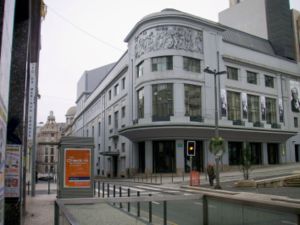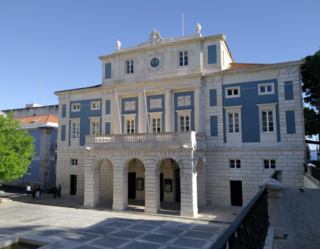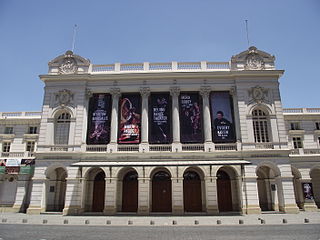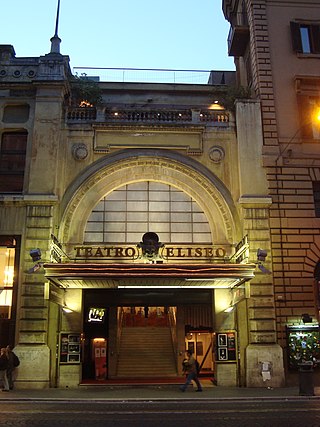

In 1913 a new theatre called Teatro Nacional opened in Porto. Over the next several years, changes in the urban center led to modernization of the property, and in 1923 the new Rivoli Theatre appeared, remodelled, adapted to cinema and with programming of opera, dance, theater and music. The new theatre, in Art Deco style, was the responsibility of the Architect and Engineer Júlio Brito.
As of 2015 [update] Rivoli Theatre is a municipal theater, Teatro Municipal do Porto.
41°08′51.92″N8°36′34.73″W / 41.1477556°N 8.6096472°W

The Teatro Nacional de São Carlos is an opera house in Lisbon, Portugal. It was opened on June 30, 1793 by Queen Maria I as a replacement for the Tejo Opera House, which was destroyed in the 1755 Lisbon earthquake. The theatre is located in the historical center of Lisbon, in the Chiado district.

The Teatro Massimo Bellini is an opera house located on Piazza Vincenzo Bellini in Catania, Sicily, southern Italy. Named after the local-born composer Vincenzo Bellini, it was inaugurated on 31 May 1890 with a performance of the composer's masterwork, Norma. It seats 1,200.

Paulo Szot is a Brazilian operatic baritone singer and actor. He made his opera debut in 1997 and his international career has included performances with the Metropolitan Opera, La Scala di Milano, Opera de Paris, Bayerische Staatsoper, Opera Australia, Liceo de Barcelona, among many others. In 2008, he made his Broadway debut as Emile De Becque in a revival of South Pacific, for which he won the Tony Award for Best Performance by a Leading Actor in a Musical, the Drama Desk Award, the Outer Critics Circle Award and the Theatre World Award. In 2012 he was nominated for a Laurence Olivier Award for best actor in a musical, and in 2014 was nominated for the MAC Award for best Celebrity Artist becoming the first Brazilian to receive such honors. In 2022, he originated the role of "Lance" in the hit Broadway musical & Juliet.

Batalha Square is a historical public square located in the city of Porto, in Portugal.
Rivoli Theatre or Rivoli Theater may refer to:

The Teatro Municipal, National Opera of Chile is the most important stage theatre and opera house in Santiago, Chile.

The Teatro Metropólitan is a theater in Mexico City. It was previously known as the Cine Metropólitan, and was built as a movie palace. The architect was Pedro Gorozpe E. with interior decorations by Aurelio G. Mendoza.

The Teatro Municipal de Lima is a theatre and concert hall in Lima, Peru. It is home to the National Symphony Orchestra of Peru. The building was inaugurated in 1920 as the Teatro Forero. It was later bought by the Municipalidad Metropolitana de Lima in 1929 and renamed Teatro Municipal.
Carlos Miguel Quintas Martins is a Portuguese stage and television actor and singer.

The Rivoli Theater is a historic theater on the eastern side of Indianapolis, Indiana, United States. The theater was built in 1927 and was designed by architect Henry Ziegler Dietz. Originally designed and built as a single screen movie theater by Universal Pictures, it was sold in 1937 and continued to provide motion pictures and live entertainment until its final closure in 1992. Since this time the venue has remained largely vacant. In 2007 the Rivoli Theater was acquired by the Rivoli Center for the Performing Arts, Inc., with the intent to restore and reopen the theater.

The Teatre Principal is the oldest theatre in Barcelona, founded in 1579, built between 1597 and 1603 and rebuilt several times, mainly in 1788 and again in 1848. The theatre was originally named the Teatro de la Santa Cruz in Spanish. It is located on the famous avenue of La Rambla.

The São Pedro Theatre is the oldest theatre in the city of Porto Alegre, the state capital of Rio Grande do Sul, Brazil.

The Teatro Eliseo is a theatre located in Rome, Italy.

The Teatro Ambra Jovinelli, formerly known just as Teatro Jovinelli, is a theatre located in Rome, Italy.

The Teatro Brancaccio, also known as Politeama Brancaccio, is a 1,300-seat theatre and cinema located in Esquilino, Rome, Italy.

The Biondo Theatre is a neoclassical and Art Nouveau-style theater building located on Via Roma #258, corner with Via Venezia, in the ancient quarter of Castellamare of central Palermo, region of Sicily, Italy. Diagonally across Via Roma is the ancient church of Sant'Antonio Abate and a stairwell descending into the warrens of the Vucciria Market.
The following is a timeline of the history of the city of Porto, Portugal.

The Teatro Sá da Bandeira is the oldest performance venue in the city of Porto, with a capacity for 786 people and opened in 1846, it was responsible for the first presentation of films produced in Portuguese, and was converted in the first years of its opening on stage to some of the 19th century theater biggest stars, such as Sarah Bernhardt, Julián Gayarre and Antonio Scalvini.

Júlio José de Brito was a Portuguese architect, engineer and teacher. He stood out mainly as an architect, having designed several emblematic buildings in the city of Porto, such as the Rivoli Theatre and the Coliseum of Porto.